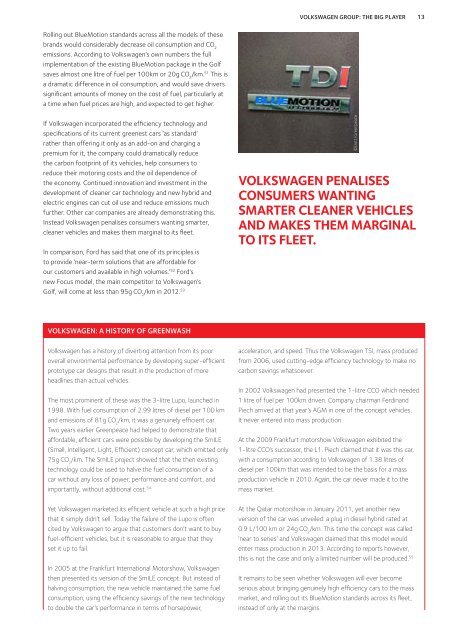The Dark Side of Volkswagen - Greenpeace
The Dark Side of Volkswagen - Greenpeace
The Dark Side of Volkswagen - Greenpeace
You also want an ePaper? Increase the reach of your titles
YUMPU automatically turns print PDFs into web optimized ePapers that Google loves.
Rolling out BlueMotion standards across all the models <strong>of</strong> these<br />
brands would considerably decrease oil consumption and CO 2<br />
emissions. According to <strong>Volkswagen</strong>’s own numbers the full<br />
implementation <strong>of</strong> the existing BlueMotion package in the Golf<br />
saves almost one litre <strong>of</strong> fuel per 100km or 20g CO 2 /km. 51 This is<br />
a dramatic difference in oil consumption, and would save drivers<br />
significant amounts <strong>of</strong> money on the cost <strong>of</strong> fuel, particularly at<br />
a time when fuel prices are high, and expected to get higher.<br />
If <strong>Volkswagen</strong> incorporated the efficiency technology and<br />
specifications <strong>of</strong> its current greenest cars ‘as standard’<br />
rather than <strong>of</strong>fering it only as an add-on and charging a<br />
premium for it, the company could dramatically reduce<br />
the carbon footprint <strong>of</strong> its vehicles, help consumers to<br />
reduce their motoring costs and the oil dependence <strong>of</strong><br />
the economy. Continued innovation and investment in the<br />
development <strong>of</strong> cleaner car technology and new hybrid and<br />
electric engines can cut oil use and reduce emissions much<br />
further. Other car companies are already demonstrating this.<br />
Instead <strong>Volkswagen</strong> penalises consumers wanting smarter,<br />
cleaner vehicles and makes them marginal to its fleet.<br />
In comparison, Ford has said that one <strong>of</strong> its principles is<br />
to provide ‘near-term solutions that are affordable for<br />
our customers and available in high volumes.’ 52 Ford’s<br />
new Focus model, the main competitor to <strong>Volkswagen</strong>’s<br />
Golf, will come at less than 95g CO 2 /km in 2012. 53<br />
VOLKSWAGEN: A HISTORY OF GREENWASH<br />
<strong>Volkswagen</strong> has a history <strong>of</strong> diverting attention from its poor<br />
overall environmental performance by developing super-efficient<br />
prototype car designs that result in the production <strong>of</strong> more<br />
headlines than actual vehicles.<br />
<strong>The</strong> most prominent <strong>of</strong> these was the 3-litre Lupo, launched in<br />
1998. With fuel consumption <strong>of</strong> 2.99 litres <strong>of</strong> diesel per 100 km<br />
and emissions <strong>of</strong> 81g CO 2 /km, it was a genuinely efficient car.<br />
Two years earlier <strong>Greenpeace</strong> had helped to demonstrate that<br />
affordable, efficient cars were possible by developing the SmILE<br />
(Small, Intelligent, Light, Efficient) concept car, which emitted only<br />
75g CO 2 /km. <strong>The</strong> SmILE project showed that the then existing<br />
technology could be used to halve the fuel consumption <strong>of</strong> a<br />
car without any loss <strong>of</strong> power, performance and comfort, and<br />
importantly, without additional cost. 54<br />
Yet <strong>Volkswagen</strong> marketed its efficient vehicle at such a high price<br />
that it simply didn’t sell. Today the failure <strong>of</strong> the Lupo is <strong>of</strong>ten<br />
cited by <strong>Volkswagen</strong> to argue that customers don’t want to buy<br />
fuel-efficient vehicles, but it is reasonable to argue that they<br />
set it up to fail.<br />
In 2005 at the Frankfurt International Motorshow, <strong>Volkswagen</strong><br />
then presented its version <strong>of</strong> the SmILE concept. But instead <strong>of</strong><br />
halving consumption, the new vehicle maintained the same fuel<br />
consumption, using the efficiency savings <strong>of</strong> the new technology<br />
to double the car’s performance in terms <strong>of</strong> horsepower,<br />
VOLKSWAGEN GROUP: THE BIG PLAYER<br />
VolKSwAgEn pEnAliSES<br />
ConSUMERS wAnTing<br />
SMARTER ClEAnER VEhiClES<br />
And MAKES ThEM MARginAl<br />
To iTS FlEET.<br />
acceleration, and speed. Thus the <strong>Volkswagen</strong> TSI, mass produced<br />
from 2006, used cutting-edge efficiency technology to make no<br />
carbon savings whatsoever.<br />
In 2002 <strong>Volkswagen</strong> had presented the 1-litre CCO which needed<br />
1 litre <strong>of</strong> fuel per 100km driven. Company chairman Ferdinand<br />
Piech arrived at that year’s AGM in one <strong>of</strong> the concept vehicles.<br />
It never entered into mass production.<br />
At the 2009 Frankfurt motorshow <strong>Volkswagen</strong> exhibited the<br />
1-litre CCO’s successor, the L1. Piech claimed that it was this car,<br />
with a consumption according to <strong>Volkswagen</strong> <strong>of</strong> 1.38 litres <strong>of</strong><br />
diesel per 100km that was intended to be the basis for a mass<br />
production vehicle in 2010. Again, the car never made it to the<br />
mass market.<br />
At the Qatar motorshow in January 2011, yet another new<br />
version <strong>of</strong> the car was unveiled: a plug in diesel hybrid rated at<br />
0.9 L/100 km or 24g CO 2 /km. This time the concept was called<br />
‘near to series’ and <strong>Volkswagen</strong> claimed that this model would<br />
enter mass production in 2013. According to reports however,<br />
this is not the case and only a limited number will be produced. 55�<br />
It remains to be seen whether <strong>Volkswagen</strong> will ever become<br />
serious about bringing genuinely high efficiency cars to the mass<br />
market, and rolling out its BlueMotion standards across its fleet,<br />
instead <strong>of</strong> only at the margins.<br />
©Dott/<strong>Greenpeace</strong><br />
13

















